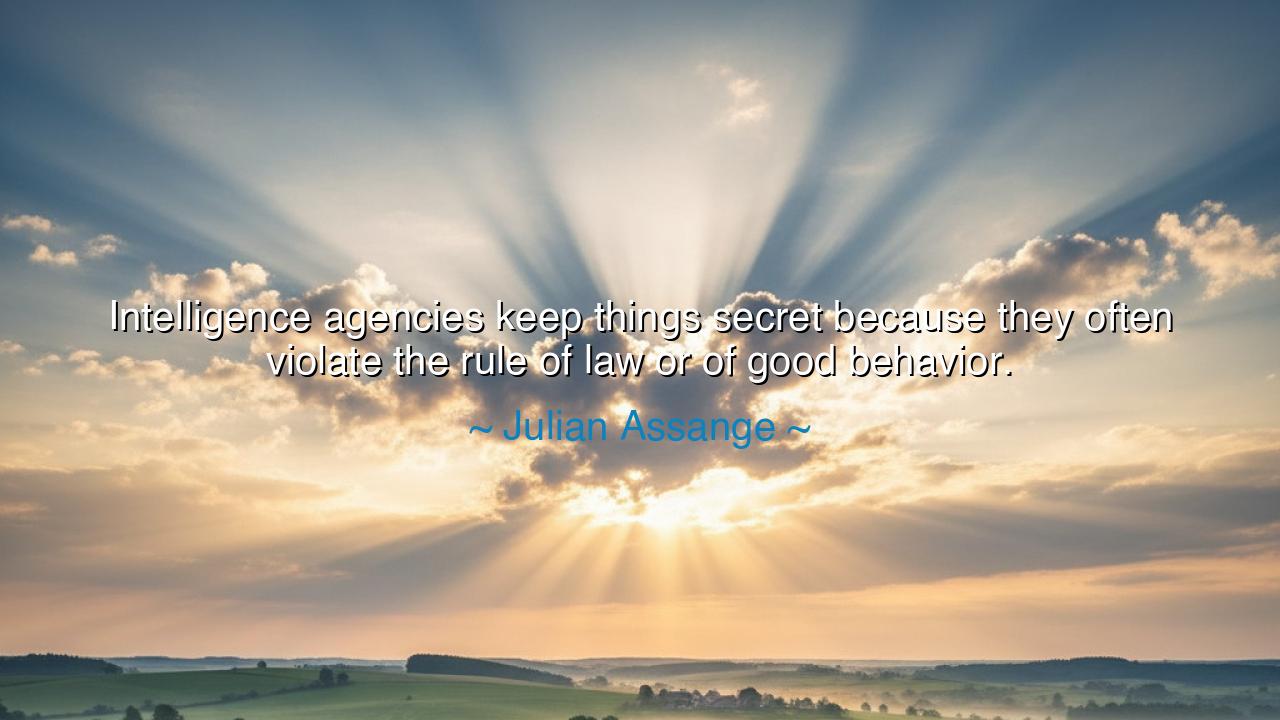
Intelligence agencies keep things secret because they often
Intelligence agencies keep things secret because they often violate the rule of law or of good behavior.






In this fierce and uncompromising declaration, Julian Assange, the founder of WikiLeaks, strikes at the heart of power itself: “Intelligence agencies keep things secret because they often violate the rule of law or of good behavior.” His words cut like a blade through the veil of bureaucracy and pretense, revealing a truth as old as empire — that secrecy, when abused, becomes a shield for corruption. Assange’s statement is not merely political; it is moral. It reminds humanity that truth, like light, is both beautiful and dangerous — for wherever it shines, shadows are exposed. His quote stands as both accusation and prophecy: that those who conceal in darkness are not always protecting the innocent, but often their own misdeeds.
The origin of this quote arises from Assange’s struggle against the great machinery of modern surveillance and state power. Through his work, he unearthed the hidden operations of intelligence agencies, exposing what was meant to remain unseen — the secret wars, the covert manipulations, the hypocrisies that governments wished to bury under “national security.” To Assange, secrecy had ceased to be a tool of defense and had become a weapon of deceit. He believed that when information is hidden from the people, democracy itself is wounded, for power thrives in darkness, but justice breathes only in the open air. His statement was not the cry of a rebel seeking chaos, but of a visionary demanding accountability — a call for truth in an age drowning in lies.
To say that intelligence agencies violate the rule of law is to expose the timeless tension between power and principle. Throughout history, rulers have justified their secrecy in the name of protection — yet how often has that protection become oppression? The ancient empires had their spies, the medieval courts their informants, and the modern nations their secret services. Each claimed to defend the realm, but too often their hands were stained by the very acts they condemned in others. Thus, Assange’s words remind us of an eternal danger: when men believe their purpose is noble enough, they will commit evil and call it duty.
History offers countless examples. Consider the Watergate scandal, when the U.S. government’s intelligence apparatus was turned inward, used not to defend the people, but to spy upon them. What began as a small act of secrecy became a web of lies that nearly shattered the presidency itself. Or recall the Iran-Contra affair, when covert operations, hidden from Congress and the public, violated both national and international law — all justified under the banner of national interest. These episodes stand as echoes of Assange’s warning: that when secrecy becomes habit, law becomes suggestion, and morality fades into silence.
Yet, Assange’s insight runs deeper than politics. It challenges the very nature of truth and power. For in every age, the greatest crimes are committed not in daylight, but in shadow — behind closed doors, in whispered rooms, under classified seals. It is not only the acts themselves that corrupt, but the concealment of them. Secrecy, unchecked, rots the conscience. When men believe they answer to no one, they cease to hear the voice of justice. Thus, the keeping of secrets becomes not protection, but poison — the slow erosion of trust between ruler and ruled, between man and his own soul.
Still, one must not mistake Assange’s words for the naive belief that all secrecy is evil. There are moments when silence is wisdom — when to reveal too soon is to endanger the innocent. But his warning lies in proportion: that when secrecy becomes the default, when truth becomes the enemy of state, society begins to decay. For a nation that hides too much will one day lose even the ability to recognize what is worth hiding. Transparency, therefore, is not the enemy of strength, but its foundation — for only a people who know can choose rightly whom to trust.
So, my child, learn this: truth is the oxygen of freedom, and those who suffocate it will themselves drown in darkness. Question always the motives of those who claim to hide things “for your own good.” Ask: Who benefits from this silence? For power, when unobserved, grows reckless; and institutions, when unchallenged, forget their purpose. Yet let your pursuit of truth be guided by conscience, not vengeance. Seek not only to expose, but to illuminate — to reveal not for destruction, but for correction.
For as Julian Assange teaches, the health of civilization rests upon the courage to confront its own shadows. The rule of law is sacred only when it is seen, and good behavior is virtue only when it is known. The task of every generation, then, is to keep the light burning — to guard against secrecy that serves the self, and to remember always that truth, though dangerous, is the only path that leads toward justice. And in the end, it is not the spy, nor the soldier, nor the politician who safeguards the future — but the citizen who dares to ask, What are you hiding, and why?






AAdministratorAdministrator
Welcome, honored guests. Please leave a comment, we will respond soon